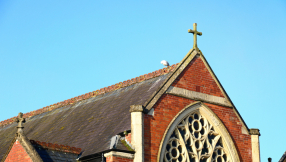Anglican evangelical bishops have warned of 'major problems' and the danger of division if the Church of England changes its stance on sexuality.
Eleven leading evangelical bishops have issued a joint letter in which they say that the traditional Christian view of sex as being for heterosexual marriage alone 'is the teaching of Scripture' and 'therefore expresses the character and will of God'.
They warn any changes in that stance 'will create major problems for many of us, both here and in the wider [Anglican] Communion', declaring that 'recent history tragically demonstrates that introducing changes in teaching and liturgy has consistently divided Anglicans globally and within provinces'.
The letter has been signed by the Bishops of Carlisle, Durham, Ludlow, Birkenhead, Willesden, Peterborough, Plymouth, Blackburn, Maidstone and Lancaster, and by the former bishop of Shrewsbury. It is understood other evangelical bishops are also in agreement with its contents. It has been sent to Bishop Christopher Cocksworth, who is chairing the Church of England's 'Living in Love and Faith' (LLF) project. This is aiming to tackle the 'tough questions and the divisions among Christians' over gender, marriage and sexuality. The project is due to report back in early 2020.
The eleven bishops pointedly comment that the Church of England's current discussions are 'taking place after the gathering of nearly 2,000 Anglicans from 50 countries at Gafcon' – the international Anglican grouping emerging as a potential future alternative to the Anglican Communion. They also highlight how the US Episcopal Church has 'struggled to enable the flourishing of those within it who remain committed to traditional biblical teaching'. Thus, they say, there is 'importance for our unity of how we teach and learn on these contested matters'.
The letter states that while modern day questioning of traditional Christian views on sex and marriage cannot be dismissed out of hand, 'neither can we simply abandon what we have received in order to appear relevant and avoid feeling uncomfortable'.
The bishops point to 'the traditional teaching of the Anglican Communion' as set out at various points including 1920, 1987 and 1998. The letter states: 'We believe that this vision of (1) sexual intercourse as "an act of total commitment which belongs properly within a permanent married relationship" (2) marriage as a union of a man and woman in a covenant of love marked by exclusivity and life-long commitment, and (3) faithful, sexually abstinent love in singleness and non-marital friendships is the teaching of Scripture. It therefore expresses the character and will of God which is our guide in ordering our lives and in addressing public global ethical issues'.
They continue: 'We also believe that reaffirming this teaching offers us the best way of maintaining our unity-in-truth.' The bishops therefore say they hope that LLF 'will clearly articulate' this teaching and indeed 'commend it, explaining why [their italics] it has been, and remains, a deeply-held conviction for most Christians'.
The letter goes on: 'The House of Bishops' conviction' – set out in a report which ran into trouble at General Synod in 2017 – 'that we should reaffirm our current teaching, liturgy and discipline and consider the limits of legitimate pastoral practice within these, will be very difficult for many to accept. It is also clear, however, that any change in teaching or liturgy will also create major problems for many of us both here and in the wider Communion.'
It may be necessary 'to consider how our structures may need to adapt' in order to enable continued fellowship 'while honestly recognising the impact of our disagreements on the shape and degrees of communion truly present among us'. A recent Church of England Evangelical Council paper exploring possible 'visible differentiation' in the future between those of conservative and liberal views in the C of E is described as 'helpful'.
The bishops call for Scripture to be given a 'central place' in the Living in Love and Faith project. And addressing the contemporary idea that people can adopt whatever identity they wish, they say that 'fundamental identity is not something we define for ourselves: rather,... we are made in God's image, have fallen captive to sin, are redeemed by Christ, and are being sanctified by the Spirit'. This ethic, they say, 'has been repeatedly affirmed' by the Lambeth Conferences of global Anglican bishops over the decades.
They describe the Church of England's witness and mission as being to 'share the good news of salvation in Christ and call people to turn, believe, and follow Him'.
The full text of the letter is being posted on the website of the Church of England Evangelical Council. Christian Today understands that there are many other evangelical bishops who support the letter, but who for a variety of reasons have not been part of this current group of signatories.
David Baker is a former daily newspaper journalist now working as an Anglican minister in Sussex, England. Find him on Twitter @Baker_David_A













